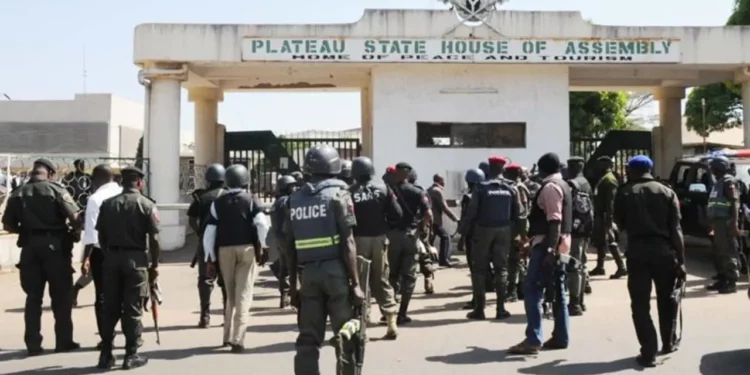The tense standoff between the 16 sacked lawmakers of the Plateau State House of Assembly and the sitting Speaker, Gabriel Dewan, is an unfortunate spectacle that threatens the stability of democratic governance.
While it is understandable that the ousted legislators feel aggrieved by what they see as an injustice, their attempt to forcibly resume duties defies the rule of law.
The path forward lies not in self-help but in strengthening institutions to deepen democracy.
The genesis of the impasse is political, but the resolution must be legal and institutional. The 16 lawmakers, all elected on the platform of the Peoples Democratic Party (PDP), were sacked by the Court of Appeal, which deemed their party primaries defective.
This is despite the Supreme Court ruling that intra-party primaries are outside the purview of electoral courts.
While the Supreme Court decried the Appeal Court’s judgment as a miscarriage of justice, it could not overturn it as the constitution makes the Appeal Court final on election petitions for legislators.
In the considered opinion of this newspaper, regardless of the moral merits, the reinstatement of the 16 lawmakers cannot happen through fiat.
The defiant lawmakers argue they have a Supreme Court judgment on their side. However, in law and procedure, the Court of Appeal verdict stands until set aside by the same court or reversed by legislation adjusting the powers of the various courts.
The lawmakers’ forced entry into the Assembly premises has no basis in law. Acting Speaker Dewan is constitutionally right to bar them.
However, while the de-seated legislators are on the wrong side procedurally, their grievance stems from genuine injustice. The Supreme Court, despite spotting the inversion of justice, could not rectify it due to rigid constitutional provisions.
This absurdity, where the highest court identifies grave injustice but is impotent to address it, is a moral indictment of our system.
It reveals gaps in our institutional frameworks that allow technicalities to trump equity and substantial justice.
The lawmakers’ predicament also spotlights the persistent threat of internal party autocracy to free and fair intra-party democracy. Their ouster arose from supposedly flawed party primaries.
This recurring problem of undemocratic practices and candidate imposition by godfathers within parties, subverting internal democracy, enables the hijacking of people’s will by entrenched interests. It must be checked firmly to deepen Nigeria’s democracy.
The lawmakers rightfully feel robbed of their mandate by machinations within their own party. But self-help, however tempting, cannot fix the anomalies. Their forced entry repudiates the very rule of law they accuse others of breaching.
Fighting lawlessness with more lawlessness will only spread anarchy and imperil democracy. As lawmakers, they must utilize and not disregard lawful channels for redress, regardless of delays and frustrations.
Needless to say, the crisis calls for urgent reforms to enhance electoral justice administration and intra-party democracy.
On electoral adjudication, the constitution should be amended to allow the Supreme Court to definitively settle election disputes rather than the current restriction to the Court of Appeal for national and state assembly.
An apex court’s judgment on the substantive merits of a case must supersede that of a lower court on mere technicalities. Such amendments will boost the quality of justice dispensed in election petitions.
Also critical are stronger regulations mandating internal party democracy and penalizing imposition of candidates by godfathers through dubious delegate selection.
READ ALSO: Plateau Assembly Resumes, Denies 16 Sacked PDP Lawmakers Entry
Party members must be empowered to vote for standard bearers of their choice. Internal democracy remains the lifeline for wider democracy. Its absence leads to the anti-democratic outcomes that caused the lawmakers’ plight and the resultant instability.
Disputes like the Plateau crisis underscore the inadequacies undermining our electoral process and internal party operations. Non-reform risks more disputes, tensions, and breakdown of order post-elections.
All institutions responsible for legal and electoral reforms, including the National Assembly and Independent National Electoral Commission (INEC), must urgently undertake the needed changes.
Citizens also have a role. The placard-wielding protesters supporting the defiant lawmakers must press, not for unlawful reinstatement, but reforms to ensure justice within parties and untainted exercise of the electorate’s sovereignty.
Their protests will be productive if channeled towards perfecting our democratic systems.
In the interim, the 16 aggrieved lawmakers must reconsider their position. Forcing their way into the chambers or even getting a favorable court order will only lead to more conflict and chaos. The path of honor may be a tortuous one but democracy is worth protecting through lawful means.
They must shun the temptation of self-help and pursue redress through legislative amendments, fresh primaries, and elections. The lawmakers face a tough battle against formidable forces, but capitulating to unlawful methods will destroy the very democratic fabric they seek to save.
The ousted members have genuine grievances arising from gaps in laws and intra-party frameworks. Their plight is a wake-up call for reforms. Justice for all will open the way for a just and stable political order.



